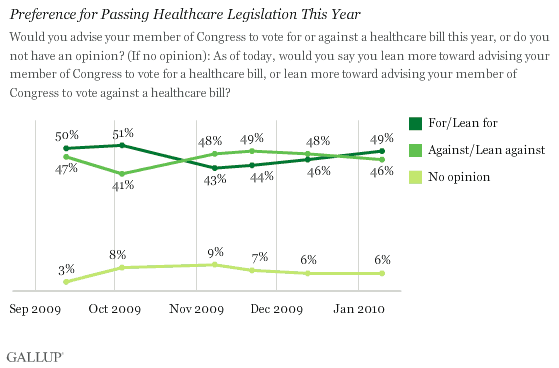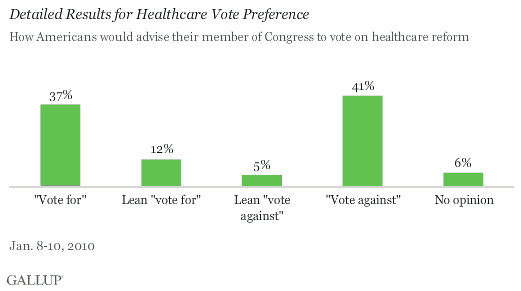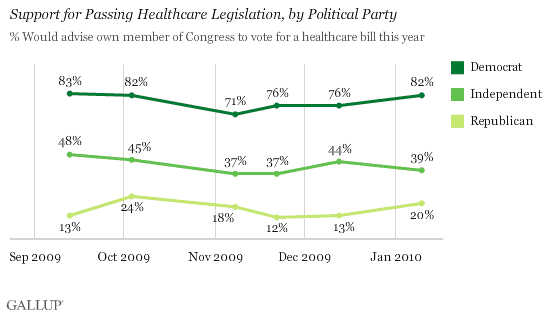PRINCETON, NJ -- Americans' support for U.S. healthcare legislation has crept up incrementally since early November. Now, slightly more Americans want their member of Congress to vote in favor of such legislation rather than against it, 49% vs. 46% -- a first since October. More broadly, however, Americans remain closely divided on the issue, with neither position attracting majority support.

"While overall public support for passing a healthcare bill currently outweighs opposition by a slight margin, the reverse is true among Americans who are seemingly more certain in their position."
The latest results are from a Jan. 8-10 Gallup survey. The framework for the Gallup question -- which asks Americans about passing healthcare reform legislation "this year" -- has changed with the turning of the calendar. Whereas last fall, "this year" meant passing the landmark legislation in the space of only a few months, in the latest poll it is associated with a full year -- which could make it seem like a far less hasty effort. However, that contextual shift does not appear to have affected responses, as public support increased between November and December (despite the shrinking time frame) before the latest increase in January.
While overall public support for passing a healthcare bill currently outweighs opposition by a slight margin, the reverse is true among Americans who are seemingly more certain in their position. This is evident in the responses to Gallup's initial question on the healthcare vote in which 37% of Americans say they would advise their member of Congress to vote for healthcare legislation this year and 41% would advise voting against it. In the follow-up question -- in which respondents who don't initially have a view are pressed to say which way they lean -- more say they lean toward supporting the bill than opposing it. Hence, total support for the bill today is slightly greater than opposition.

Independents and Republicans Still Cool on Reform
Whereas a large majority of Democrats continue to want their member of Congress to vote for a healthcare bill this year, more than half of independents and a solid majority of Republicans favor a "no" vote.

This aligns with the basic pattern of partisan support for healthcare legislation that Gallup has observed over the past several months, although support is up slightly since late November among both Democrats and Republicans.

In line with these partisan distinctions, support for passing healthcare legislation this year is higher among women than among men (54% vs. 42%), among nonwhites than among whites (67% vs. 41%), and among low-income Americans (63% of those earning less than $30,000 a year) compared to middle- (44%) and upper-income Americans (45%). Additionally, support is much higher among adults aged 18 to 34 (61%) than it is among those 35 to 54 (48%) and 55 and older (40%).
Bottom Line
Public support for passing healthcare reform legislation this year is marginally higher than it was three months ago, but still doesn't rise to majority level. Thus, neither party in Washington can claim that advancing or, alternatively, defeating the legislation represents the will of the people on this important issue. However, the Democrats may have the politically riskier position (headed into a midterm election year), as more than half of political independents side with most Republicans in opposing the bill.
Survey Methods
Results are based on telephone interviews with 1,023 national adults, aged 18 and older, conducted Jan. 8-10, 2010. For results based on the total sample of national adults, one can say with 95% confidence that the maximum margin of sampling error is ±4 percentage points.
Interviews are conducted with respondents on land-line telephones (for respondents with a land-line telephone) and cellular phones (for respondents who are cell-phone only).
In addition to sampling error, question wording and practical difficulties in conducting surveys can introduce error or bias into the findings of public opinion polls.
